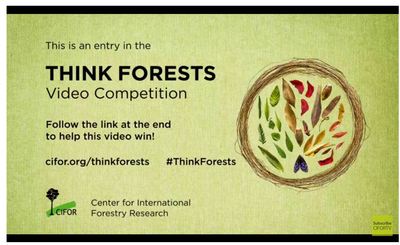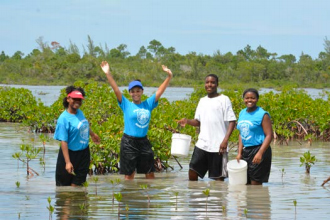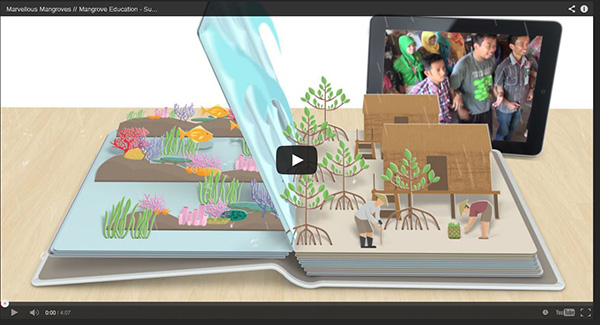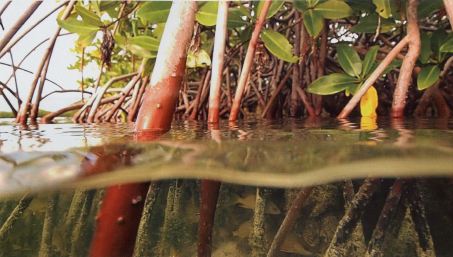FEATURE STORY LAST CHANCE to VOTE for MAP’s new Video

USA – Please watch MAP’s new short video called Think Mangrove Forests, which has been entered into a video competition held by Center for International Forestry Research (CIFOR). In ‘Think Mangrove Forests’, Leo Thom, Alfredo Quarto, Jim Enright and Martin Keeley tell the story of why we need mangroves, how they are under threat, and what we can do to protect them. 1. If you like our video, scroll down and write a comment in the box that says “Join the discussion…”
2. Make sure you are signed into either twitter, facebook, google, or if you prefer sign up with Discus to leave a comment. This counts as a vote for our video
3. Scroll back up to the video and use the social media icons to share the video with friends, family and colleagues. Please click this link to watch the video and follow with your vote! AFRICA Kenyan fishing town swaps boats for mangroves and mariculture

KENYA – For the past five years, members of the Mtongani Self Help Group have been acting as volunteer forest guards, restoring mangroves along the Kilifi Creek, some 75 km (46.6 miles) from Mombasa, Kenya’s second-largest city. They also maintain four tidal fish ponds nearby, which help them conserve local marine life and make a living as climate change impacts bite and fish catches on the open sea shrink. “I am educating my children from the proceeds I get from planting these mangroves, and selling the prawns and fish we farm,” said Mramba. According to the Kenya Marine and Fisheries Research Institute (KMFRI), coastal mangrove forests are among the world’s most important wetland ecosystems, providing crucial habitat for wildlife and fish, slowing coral reef sedimentation, and protecting coastlines from severe weather events. READ MORE Protecting Our Mangroves
GAMBIA – The National Environment Agency’s project on coastal resilience in which they are planting mangroves in communities like Kiang is a wonderful initiative. Settlements along the Bintang Bolong tributary, from Bwian in WCR to Sandeng in LRR, there is a presence of high mortality rate of mangroves on one hand and salt intrusion on the other. This is worrying because mangrove serves as environmental indicator and also provides home to many aquatic lives, breeding spot for juvenile fish. Planting mangroves can help the communities regenerate their vegetation cover and get ready to fight climate change. Mangroves are critical to habitat for many species of fish and wildlife; they serve as coastal fish and shellfish nursery habitat, and produce large quantities of leaf material that becomes the basis for a detritus food web. READ MORE ASIA MAP teams up with South East Asian Ministers of Education

Jim Enright, MAP Asia Coordinator and Mery Christina Nainggolan, MAP Intern from Indonesia, recently attended a mangrove conservation consultative meeting and study trip in Bangkok. MAP-Asia was invited by Southeast Asian Ministers of Education Organization Regional Center for Archaeology and Fine Arts (SEAMEO SPAFA) to participate in a consultative meeting and study visit to Khlong Phitthaya Longkorn Primary School and Bangpakong Bovorn Witthayayon Secondary School, as SEAMEO SPAFA has been associated with both schools in their mangrove conservation education by supporting a Mangrove Eco-museum Project and promoting mangrove education teaching materials. SEAMEO SPAFA is an international organization dedicated to promoting co-operation in education, science and culture in Southeast Asia. MAP welcomes this new partnership with SEAMEO SPAFA with the hope MAP’s own Marvelous Mangrove school curriculum can be utilized by selected schools with the mutual goal of increasing mangrove conservation awareness among students in the Southeast Asia Region. READ MORE Ecotourism success story
THAILAND – A homestay in Trang has helped a small community thrive while keeping intact its way of life. It all began with the need to feed their families. Today, the small cluster of people in Ban Bo Hin community who run a successful homestay have become an ecotourism model for other villages. Bo Hin in Si Khao district, Trang province, is a community tourist attraction founded by the Ban Pru Jud Community Enterprise. It has been operating for 10 years showcasing the value of homeland and the self-sufficiency philosophy, with monthly income doubling to 40,000 baht over that period for families that jointly provide the homestay service. In the past, people in this community depended mainly on fish cage farming and fishing. But now many of them prefer to be tour guides informing mostly urban visitors about their community lifestyle. Bo Hin was the first community to start a homestay in Trang. Today there are eight homestays in eight different communities in the province, and more than 100 in the South, reflecting the growing ecotourism trend in this part of Thailand. READ MORE Singapore is dredging our home away: hands off our sand!
SINGAPORE – Sand is a valuable resource that is becoming increasingly scarce. The construction industry, which consumes the lion’s share, prefers rough sand from riverbeds and coastal areas. Dredging, however, is responsible for the wholesale destruction of aquatic and coastal ecosystems. Singapore is the world’s largest importer of sand. The city-state consumes 30 million tons a year for construction projects and land reclamation – and obtains it by dredging away its neighbors’ beaches, coastlines, riverbeds and entire islands. In Cambodia, fishermen and their families are actively resisting the destruction of their rivers and mangrove forests by illegal dredgers. Activists of our Cambodian partner Mother Nature are supporting their protests and the organization’s co-founder Sun Mala and two of his colleagues were arrested on August 17. Cambodia’s Prime Minister Hun Sen prohibited the export of sand from riverbeds and coastal areas in 2009, but Singapore and the Cambodian authorities are simply ignoring the ban. READ MORE AMERICAS MAP members collaborate on text book.

USA – MAP’s executive director, Alfredo Quarto, and Sara Lavenhar, MAP’s outreach coordinator have recently collaborated to write a chapter of a new school textbook on food regulation law policy. The textbook, scheduled to print in May of 2016, features a chapter titled “Industrial Aquaculture: Human Intervention in Natural Law” which was coauthored by the two. International Food Law and Policy is an interdisciplinary work, with a comprehensive, reader-friendly approach to teaching the major aspects of food regulation, law, policy, food safety and environmental sustainability in a global context. It provides a foundation for courses and master’s programs in environmental management, food law, policy and regulation, and sustainable development around the world. READ MORE Mangroves are a critical component
USA – Take Southwest Florida’s mangroves away, and what do you have? Fewer fish, less wildlife and dirtier water. Simply put, mangroves make the area what it is, and though they were once viewed as a nuisance to be ripped out for waterfront development, they are now protected by Florida law. Mangroves are also strange and fascinating organisms, plants that thrive in low-oxygen soils and salt water. In the fourth century B.C., Greek philosopher Theophrastus seemed baffled in describing the mangroves of the Red Sea and Persian Gulf: “These trees are all washed by the sea up to their middle … and they are held up by their roots like a polyp, for whenever there is an ebb-tide, (the roots) may be seen. … Some have their roots always flooded by the sea … and nevertheless the tree does not perish by the sea.” READ MORE Carbon Dioxide and Mangroves: Equivalent to Removing Cars From Road
USA – Mangrove conservation efforts not only prevent habitat loss, but also help regulate carbon dioxide emissions. According to researchers from Duke University, protected areas in Indonesia have maintained 35,594 acres of mangrove habitats and prevented the release into the atmosphere of about 13 million metric tons of carbon dioxide that the mangrove roots help store. “This is not a small number,” Daniela Miteva, a postdoctoral researcher at The Nature Conservancy and a Duke University alumna, said in a news release. “Protected areas have reduced the rate of mangrove loss by about 28 percent in Indonesia, which has the world’s largest area of mangroves.” The researchers analyzed the success of protected areas from 2000 to 2010. Their findings were recently published in the journal Ecological Economics. READ MORE New Student Project to Restore Mangroves in The Bahamas

BAHAMAS – This week, the Khaled bin Sultan Living Oceans Foundation (KSLOF) is launching Bahamian Awareness of Mangroves (or B.A.M. for short), a new program to support mangrove education and restoration in The Bahamas. The B.A.M. program will provide classrooms with lesson plans and activities as well as funding and support to take students on field trips to mangrove forests. Students will get the opportunity to experience the mangrove ecosystem first-hand and help restore it. During the project, students will grow mangrove propagules in their classroom that they will study and plant in a local mangrove forest at the end of the school year. Amy Heemsoth, the Director of Education at KSLOF is in Abaco this week educating students about life in a mangrove forest, conducting teacher trainings, and leading field trips into mangrove forests to connect students with nature. She hopes that “students who participate in the project will take ownership of the mangroves in their country and that they will be inspired and empowered to preserve them, even after the project is complete.” READ MORE EUROPE UK government highlights opposition to plan for Bangladesh coal mine

UK – The UK government has published a statement today that highlights the fierce opposition to British company GCM Resources’ plans for a massive open cast coal mine in Phulbari, north-west Bangladesh. The statement notes protestors “calling strikes, blockading roads and occupying the company’s local offices”. GCM’s planned Phulbari coal mine has provoked repeated protests by local people. Three people were killed and many more injured when paramilitary officers opened fire on a demonstration against the project in 2006. Protests in 2013 and 2014 forced the company’s CEO Gary Lye to abandon visits to the area. The government’s statement expresses “regret” that the company had failed to update its plans or produce a human rights impact assessment for the project, as recommended in the findings of its investigation under the OECD Guidelines on Multinational Enterprise. READ MORE OCEANA India losing green cover faster than ever, warns study

AUSTRALIA – The world’s forests have shrunk by three per cent since 1990 – an area equivalent to the size of South Africa – and India is among the countries who are losing their forest cover faster than others, researchers have warned. The green cover is being more rapidly lost in some of the developing and poorest countries including India, Vietnam and Ghana. “In low-income countries with high forest cover, forests are being cleared for direct subsistence by individuals and families and large scale agriculture for broader economic development,” said lead researcher and professor Rod Keenan from University of Melbourne. “Some have policies and regulations to protect forests, but they do not have the capacity and resources to implement them,” he added in United Nation’s Global Forest Resources Assessment (GFRA) 2015 report released this week. READ MORE LAST WORD(S) MAP extends a warm welcome to our newest intern – Welcome Tina! Hi everyone ! Let me introduce myself. I am the new intern in the MAP Thailand and just arrived here in Trang. My name is Mery Christina (you can call me Tina), I come from Indonesia. Recently I just finished my job for two years at a Disaster Risk Reduction Program of Mercy Corps for 2 villages that is prone to flood in West Java Indonesia. I have dealt with infrastructure projects such as evacuation path construction, river dredging construction, small scale organic farming setup; and organizing several capacity building for communities such as water rescue training, Disaster Risk Reduction Capacity Building and organizational skills training and etc. As working with Mangrove projects is the first time for me, I hope that I could contibute and learn much by being an intern here in MAP. Best regards,
Mery Christina Nainggolan
MAP-Asia Office Development & Field Project Assistant (Intern) BACK TO TOP
Not yet a subscriber? Please cut and paste these news alerts/ action alerts on to your own lists and contacts. Help us spread the word and further generate letters of concern, as this can make a big difference in helping to halt a wrongdoing or encourage correct action. ACTION ALERTS WANTED: MAP News is looking for links to calls to actions/petitions and letter writing campaigns on mangrove issues, tropical coastal communities and other related topics. Not all submissions can be selected, but we look forward to hearing about your work and want to let our readers’ voice be heard! Email submissions to news@mangroveactionproject.org | Action Alerts: Singapore is dredging our home away: hands off our sand! TAKE ACTION Millions of reasons to love mangroves CLICK HERE Ensuring environmental protections for Antigua CLICK HERE Volunteer Opportunities with Mangrove Action Project CLICK HERE
STOP PLANTING MANGROVES ON SEAGRASS BEDS _ A CALL TO ACTION
Our short presentation will give you a better understanding of the issues we are working to solve. WATCH PRESENTATION
What is CBEMR? Easy to follow fact sheet – CLICK HERE SHARE MAP’S VISION
CLICK HERE to watch short introductory video. Together we can work “at the roots of the sea”. Join us in saving our beautiful country!
We hope you have been following the ongoing battle in Bimini, Bahamas.
We are in need of your help more than ever Click here Exclusive Interview with Alfredo Quarto, Co-Founder and Executive Director of Mangrove Action Project – See more Question Your Shrimp- Don’t Buy or Sell Imported Tropical Shrimp! Sign the Petition
Marvellous Mangroves Curriculum
Marvellous Mangroves Curriculum in Bangladesh – WATCH VIDEO
MARVELLOUS MANGROVES IN BRAZIL
En Portuges 
Marvellous Mangroves – A Curriculum-Based Teachers Guide. FOR MORE ON MAPs AWARD WINNING CHINA MANGROVE CURRICULUM VISIT

VIMEO SHOW VISIT OUR “MM” WEBPAGE Check out our presentation for more details on Marvellous Mangroves “Education In The Mangroves” can now be seen on the PhotoPhilanthropy website here! Read this 10 page history of the development of MAP’s educational curriculum VIEW DOCUMENT Article in Canada’s Green Teacher Magazine – Read More
FREE MAP Mangrove e-cards CLICK HERE
 MAP’s e-Cards offer you a unique way to spread the word about MAP’s good works, while sharing beautiful photographs of the mangroves
Donate to MAP via Paypal
Giving could never be easier  It’s the action, not the fruit of the action, that’s important. You have to do the right thing. It may not be in your power, may not be in your time, that there’ll be any fruit. But that doesn’t mean you stop doing the right thing. You may never know what results come from your action. But if you do nothing, there will be no result. It’s the action, not the fruit of the action, that’s important. You have to do the right thing. It may not be in your power, may not be in your time, that there’ll be any fruit. But that doesn’t mean you stop doing the right thing. You may never know what results come from your action. But if you do nothing, there will be no result. —Mahatma Gandhi Green Planet Fundraising Assists MAP – LEARN MORE
MANGROVE ISSUES The importance of restoring mangroves in an effective, long-term manner. Mangrove CBEMR video – VIEW Question Your Shrimp Consumer/Markets Campaign! WATCH VIDEO Mangrove Restoration in Asia – Watch Short Video 
READ A MOSAIC OF LIFE Peek into the underwater world of mangroves, “womb of the sea.” By Liz Cunningham Photos By Wes Matweyew and Liz Cunningham
“Question Your Shrimp” Campaign Learn more about the affects of the shrimp industry on mangroves by visiting our blog Editor’s Note: Mangrove Action Project’s Executive Director, Alfredo Quarto was interviewed about shrimp by Green Acre Radio’s Martha Baskin LISTEN TO INTERVIEW Information sheds clear light on shrimp-mangrove connection
Join MAP on Facebook
Sign the Consumer’s Pledge to avoid imported shrimp
Not yet a MAP News subscriber?
Click here to subscribe.
Note to Our Readers:
We strive to keep active links in our newsletter. However, due to circumstances beyond our control, occasionally links to stories may become broken. If you find a link to a story is not functioning, please cut and paste the headline into your browser search bar. In most cases you should be able to locate the original story.
Help Mangrove Action Project through your recycled E-Waste. List of Accepted E-waste Items: Injet Cartidges, Cell Phones, Pagers, GPS, Radar Detectors, Mobile Hot Spots, Calculators, eBook Readers, iPods/MP3 players, Digital/Video Cameras/Camcorders, PDAs, iPads/Tablets/Laptops, Video Game Consoles, Handheld Video Games Visit the Mangrove Action Project recycle website Click on the recycle button then click on the Download Shipping Label, and follow the instructions. |













